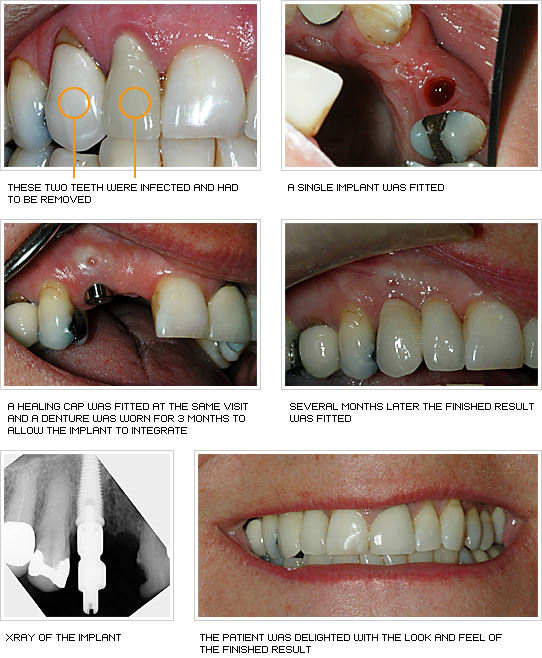A Biased View of Dental Sense
A Biased View of Dental Sense
Blog Article
Indicators on Dental Sense You Need To Know
Table of ContentsOur Dental Sense IdeasDental Sense Things To Know Before You BuySome Ideas on Dental Sense You Need To KnowThe Ultimate Guide To Dental Sense
are medical devices surgically dental implanted right into the jaw to bring back an individual's capacity to eat or their look. They supply support for synthetic (fake) teeth, such as crowns, bridges, or dentures. When a tooth is lost due to injury or condition, an individual can experience issues such as fast bone loss, malfunctioning speech, or adjustments to chewing patterns that result in pain.Dental implant systems are composed of an oral implant body and dental implant joint and might additionally include an abutment addiction screw. Wisdom tooth cavity. The dental implant body is operatively placed in the jawbone instead of the tooth's root. The oral implant abutment is generally connected to the implant body by the abutment addiction screw and prolongs via gums into the mouth to support the affixed synthetic teeth
(https://giphy.com/channel/dentalsense1)Framework of The Oral Implant System selecting dental implants, speak to your dental supplier concerning the possible benefits and risks, and whether you are a candidate for the treatment. Points to think about: Your general wellness is a crucial variable in figuring out whether you are a great candidate for oral implants, the length of time it will take to recover, and for how long the implant may remain in location.
Smoking might impact the healing process and decrease the long-lasting success of the dental implant. The healing procedure for the implant body might take numerous months or longer, during which time you typically have a temporary abutment in location of the tooth. the dental implant treatment: Very carefully follow the dental hygiene instructions provided to you by your oral copyright.
Excitement About Dental Sense
Implant failure can cause the demand for an additional medical procedure to take care of or replace the dental implant system. Restores the capacity to chew Brings back aesthetic look Helps keep the jawbone from diminishing because of bone loss Protects the wellness of the bordering bone and periodontals Aids keep nearby (close-by) teeth stable Enhances lifestyle Damage to surrounding natural teeth throughout implant placement Injury to the surrounding cells during surgical treatment, such as sinus opening Injury during surgical treatment (for instance, crack of bordering jawbone) Insufficient function, such as seeming like the teeth do not attack together typically An experience that the tooth is loosened or turning in area resulting from an abutment screw loosening up Implant body failing (looseness of the implant body) because of systemic infection, which might be most likely in people with unchecked diabetics issues as a result of neighborhood infection in bone and periodontals supporting the implant body as a result of postponed recovery, which might be more probable in patients that smoke Trouble cleansing the periodontals around the implant, leading to bad dental hygiene Untreated periodontal disease Post-surgical tingling as a result of nerve impingement or damages Always notify healthcare companies and imaging service technicians that you have oral implants prior to any kind of magnetic vibration imaging (MRI) or x-ray treatments.
FDA is not knowledgeable about any type of unfavorable events reported for MRI or x-ray treatments with oral implants. Dental implants systems are usually made from materials that comply with worldwide agreement requirements of the International Organization for Standardization (ISO) or ASTM International. These criteria have information of what makes a risk-free material.

A dental implant is a structure that replaces a missing out on tooth. With screw-like tools, the cosmetic surgeon inserts a dental implant into the jawbone, and it acts as a support for a synthetic tooth, called a crown. A device called an abutment links the artificial tooth to the dental implant. The crown is customized to fit the person's mouth and match the shade of their teeth.
Excitement About Dental Sense
Some individuals are not eligible for oral implant surgery. It is for dental cosmetic surgeons to operate on people with: acute illnessuncontrollable metabolic diseasebone or soft cells condition or infectionIf these problems are fixed, a person can have the surgical treatment. In, dental specialists avoid running on individuals with: If people with any one of the above go through dental implant surgery, there is a greater danger of the implant failing.

Oral dental implant surgery is a tailored procedure. Offer you time to recover. Affix the post and final crown, bridge or denture.
Next, your cosmetic surgeon will thoroughly place the oral implant into your jaw. If your implant is near the front of your mouth, your dental practitioner will certainly make a short-lived tooth for you to put on until you recover.
Get This Report on Dental Sense
Throughout the recovery phase, your jawbone must fuse to the dental implant. This procedure can take anywhere from 3 to nine months.
As soon as your implant heals, your dentist can connect the joint (tiny connector article) and your last remediation (crown, bridge or denture). This usually takes regarding one hour to finish and might call for a second minor surgery. You should you could try these out not really feel any kind of discomfort during your oral implant procedure due to the fact that your provider will utilize medicine to numb your gum tissues.
Report this page